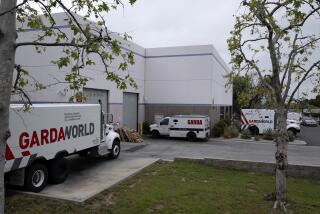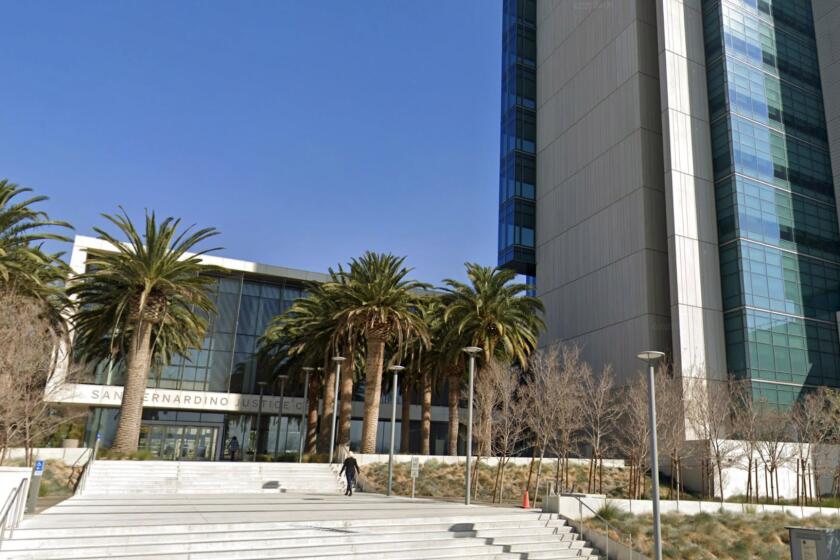Mission Viejo Co.: A Proud Legacy Marred by Discord
Long before the red tile roofs of Mission Viejo sprawled across southern Orange County’s foothills, the community took shape on a mass of blueprints and photographs prepared by the fledgling Mission Viejo Co.
In those days, the company consisted of three executives, a bookkeeper and a secretary, and it grew up with warm community support. But today, that support is being tested as Mission Viejo grows more independent from the company that built it.
Over the years, the company, which now boasts more than 300 employees, nurtured its proud creation, sponsoring and sustaining various civic organizations that helped govern local affairs.
“There was a real sense of working together to build this community,” recalls City Councilman Norman P. Murray, regarded by many as Mission Viejo’s senior statesman. “People pitched in, and the company took great pride in its work.”
Murray, one of many Mission Viejo residents who laud the Mission Viejo Co. for its architecture and management style, remains among the company’s most loyal defenders in Mission Viejo, but that has become a more controversial proposition.
“The Mission Viejo Co. has tried to run this place like a company town,” said Milton Gerloff, president of Citizens Against Lake Mandatory Membership. “They do what they think is best for us, no matter what we think.”
Melody Carruth, who, as a leader of Citizens to Save Laguna Hills, has butted heads with the Mission Viejo Co. and its representatives, is equally vehement: “Most people in this area view the Mission Viejo Co. as a bunch of thugs,” she said. “It’d be great if the company would just stick to what it does best, which is build beautiful homes.”
And City Councilman Robert A. Curtis, probably the company’s harshest critic and the subject of a recall effort that it backs, is especially blunt: “The Mission Viejo Co.’s whole approach is: You agree with them or you will be destroyed.”
The community is partly to blame for the rift between residents and the company, as politicians like Curtis make hay blasting the Mission Viejo Co. As the city enters its municipal adolescence, strife with the parent company may be a natural expression of independence, company and city officials agree.
But critics say the company also shoulders much responsibility for the breakdown in trust. Since its 1972 acquisition by New York-based Philip Morris Cos., and particularly in the two years since Mission Viejo became a city, the Mission Viejo Co. has become increasingly obstinate and remote, they say.
“I find it very strange,” said Mayor Christian W. Keena, who offers glowing praise of the company’s work but remains puzzled by some of its recent actions. “They’ve built this wonderful community, but they’ve really hurt their own public image. . . . They’ve just decided not to be open.”
Many of the company’s image problems can be traced to some of its forays into the public arena. In 1988, it backed a recall election in Laguna Beach--though at first it denied its participation--and recently the company has pumped thousands of dollars into a Mission Viejo annexation fight and recall election.
It has cast large numbers of proxy ballots to influence homeowners’ association races, backed lawsuits and petition drives, and dispatched highly paid political consultants to contest measures it dislikes. In 1983, it even waged a campaign against a group of store owners for displaying American flags. The company considered them a form of advertising.
But the Mission Viejo Co., in that as in most other disputes, insists that its main responsibility to property owners is to protect and complete the community’s master plan, devised in the early 1960s and only changed slightly in the years since.
“We’ve made promises to this community that we would complete this community according to the plan,” said David A. Celestin, the company’s vice president for planning and governmental relations. “We have objected to efforts to change that plan, and we will continue to.”
But Celestin, in a wide-ranging interview last month, agreed that the past few years have not always been smooth ones, at least in terms of the company’s relations with the local government.
“You’re going to have people complaining anywhere, and, yes, we have some here,” he said. “We have the ‘Nimbys’ (Not in My Back Yard), and we have what I call ‘IGMs,’ the ‘I Got Mine’s.’ ”
Much of the recent controversy dates from Curtis’ efforts to annex a pie-shaped piece of property on Mission Viejo’s western border. That area, known as Aegean Hills, is so closely affiliated with Mission Viejo that residents’ addresses say Mission Viejo and even the freeway exit fails to distinguish between the communities.
In 1988, the City Council voted 5 to 0 to proceed with plans for annexing the neighborhood, but company officials strongly objected, saying the annexation would compromise the company’s master plan.
The company helped support a petition drive opposing the annexation and urged its employees to participate in the effort, a suggestion that stunned city officials.
Eventually, the council reversed itself, voting 3 to 2 against the annexation. Still, Curtis’ persistence incurred the company’s wrath, and it has spent more than $57,000 to aid the recall campaign.
Curtis claims that the company backs his recall, which will be decided by a Feb. 27 election, because he has supported slow-growth measures, but the company denies that, saying it grows solely out of the annexation dispute.
For whichever reason, the company’s actions strike some residents as heavy paternalism and overkill.
“It’s just ridiculous that they’ve reacted like this,” said Virginia Lavan, chairwoman of a group called Citizens Against Coercion by the Mission Viejo Co. “All just because of a disagreement about annexation? They’re trying to silence someone who opposes them.”
Celestin disagreed.
“We are not challenging the council’s right to run its city,” he said. “But we think people have a right to be listened to, and as long as they exercise that right, we’ll be there to support them.”
According to some observers, what has hurt the company’s image more than its recent political adventures, however, is its mechanism for dealing with the public. James G. Gilleran, the company’s president and chief executive officer, rarely makes public comments, and local leaders complain that he is unresponsive and difficult.
Gilleran is not the only company official who is elusive; normally, all press and public questions are referred to Wendy Wetzel, the company’s spokeswoman. When Celestin agreed to be interviewed last month, Wetzel was openly surprised, saying it was the first interview request in years that she could remember having been approved.
“That’s really a matter of corporate and personal style,” Celestin said. “Jim Gilleran wants to make sure that any information that is provided is accurate and correct, so he wants to check all of it before it goes out.”
But the reluctance of top company officials to deal openly with city leaders and members of the public has taken a toll on the company’s public image. It shows up in contrast to the generally positive reputation enjoyed by the Santa Margarita Co.
“The Mission Viejo Co.’s style is somewhat different from the Santa Margarita Co., which tends to be very open and very pro-information,” Keena said. “That makes a big difference in the way they are perceived.”
At Santa Margarita, President and Chief Executive Officer Anthony R. Moiso often speaks publicly, dedicating local projects, answering press questions and meeting with local leaders.
Moiso, a former executive vice president of the Mission Viejo Co., was reluctant to comment on the differences between the two organizations.
Still, Moiso and other observers suggest that public image may matter less to the Mission Viejo Co. now that its time in the city is drawing to a close.
“We’re going to be here forever,” Moiso said, pointing to a set of wall maps that outline his company’s development plans for South County. “They’re just winding down.”
As critics bridle at the Mission Viejo Co., many blame its problems on Philip Morris, a Fortune 500 company best known as a cigarette maker. Under Philip Morris, the Mission Viejo Co. has lost its local identity, critics say.
That has become a rallying cry of Councilman Curtis’ anti-recall campaign. Curtis almost never refers to the Mission Viejo Co. by that name, instead directing his barbs higher up the corporate ladder, at Philip Morris. It is a technique that sets Curtis up as the David against a New York-based Goliath, and it appears to resonate in a community that prides itself on its insularity.
The recall, Curtis said, as he does frequently, “is an attempt by Philip Morris to dictate the affairs of this city.”
Repeated calls to the Philip Morris Cos.’ New York headquarters were not returned or were referred to the Mission Viejo Co. Although two Philip Morris officials, as well as two former officials, agreed to discuss the company’s relationship with the Mission Viejo Co., they would not allow their names to be used.
Those officials and others, however, said that Philip Morris probably exercises little direct control over the Mission Viejo Co.’s operations. Moiso, who worked closely with Philip Morris during its takeover of the Mission Viejo Co., said he doubts that Philip Morris would meddle deeply in local affairs.
“They’re very decentralized and very well-managed,” one former Philip Morris executive said of the New York company. “If anything, I would attribute the problems in Mission Viejo to their getting too little direction from New York, not too much. It sounds to me like a case of the extremities getting further and further from the heart.”
In addition, some local leaders, including Keena and Curtis, believe that Philip Morris is divesting itself of its real estate operations. In the process, Curtis and others say, the company may be rushing to make quick profits at the expense of the community.
Wetzel and Celestin would not respond directly to questions about whether the company is quitting the real estate business other than to say that such questions are “always under review.”
What is clear, however, is that the company’s run inside Mission Viejo is just about over. By the mid-1990s, Mission Viejo’s last home will have been built and sold, and the company that built the town will have turned over its management to the council that now governs it.
For the company, then, the recent travails come just as officials would like to bow out of Mission Viejo gracefully. And despite more than two decades of closely parenting Mission Viejo, they threaten to mar the company’s legacy with discord.
Even so, Celestin gives no hint that recent events have unduly alarmed company leaders.
“We’re proud of this community,” he said. “It’s a place. You can see it, you can feel it, you can smell it. We plan to leave it the way we set out to. We’re going to complete the plan.”
A BRIEF HISTORY OF MISSION VIEJO
Key dates in the history of Mission Viejo and the Mission Viejo Co.
November, 1963--Mission Viejo Co. formed to initiate residential development on 10,000 acres of South Orange County.
November, 1965--First homes in Mission Viejo are offered for sale. Home prices at the time average about $23,000.
September, 1966--Mission Viejo High School opens.
October, 1969--Philip Morris Cos. Inc. acquires major interest in Mission Viejo Co.
September, 1972--Mission Viejo Co. becomes wholly owned subsidiary of Philip Morris Cos.
June, 1978--Lake Mission Viejo opens.
April, 1981--Mission Viejo Co. begins home construction in Aliso Viejo.
July, 1984--Olympic games commence with long-distance cycling events in Mission Viejo.
January, 1986--Mission Viejo celebrates 20th anniversary; 20,000 homes completed; home prices now average close to $300,000.
November, 1987--Mission Viejo residents vote to incorporate and elect first City Council.
March, 1988--Mission Viejo becomes a city. Norman L. Murray named first mayor.
October, 1989--Backed by the Mission Viejo Co., opponents of City Councilman Robert A. Curtis qualify their recall drive. Council votes to hold special recall election in February, 1990.
January, 1990--Councilman Christian W. Keena becomes city’s third mayor, succeeding William S. Craycraft, the top vote-getter in 1987 elections.
Sources: Mission Viejo Co. and city of Mission Viejo
More to Read
Start your day right
Sign up for Essential California for news, features and recommendations from the L.A. Times and beyond in your inbox six days a week.
You may occasionally receive promotional content from the Los Angeles Times.







